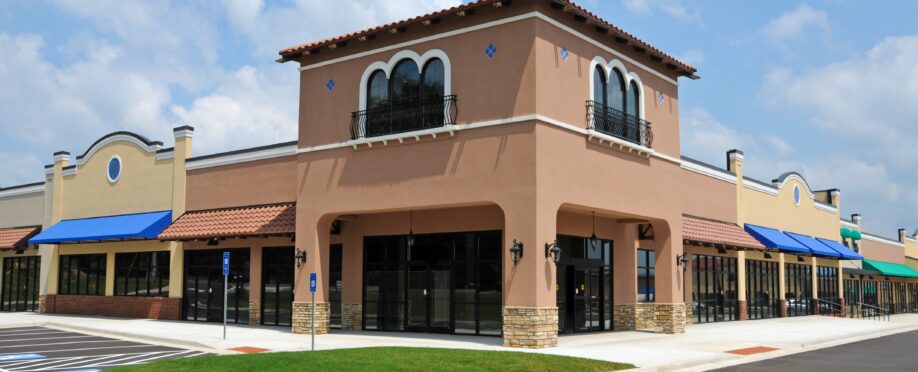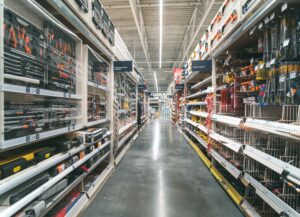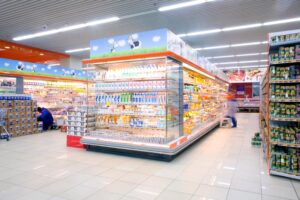
Retail has always been an evolving space, but in these digitally accelerated times and amid rising sustainability standards, the industry is entering a new era of store development. From immersive customer experiences to smarter, greener building systems, today’s retail environments must do more than just sell — they need to adapt, inspire, and perform.
In this guide, we explore some of the most important trends shaping retail store development today, key aspects of retail store development, and best practices that can help retail development teams deliver efficient, engaging, and future-ready stores.
What Is Retail Store Development?
Retail store development is the process of designing, building, remodeling, or expanding physical environments to improve the customer experience, enhance operations, and align with business goals.
It encompasses far more than just construction — including layout planning, systems integration, energy efficiency, and experience design.
Key aspects of retail store development comprises:
- Site selection and space planning
- Architectural and engineering design
- MEP and HVAC system planning
- Construction and remodeling
- Fixture and equipment installation
- Brand identity, signage, and décor
- Energy, sustainability, and systems commissioning
- Multi-site rollout management
Retail Store Development Trends Shaping the Industry
As Area Development reports, retailers today aren’t just building stores — they’re reimagining what physical retail can be. Here are three trends shaping the future of retail store development:
1. Experiential Retail
Modern stores are becoming more than shopping destinations — retailers are creating immersive, sensory-driven environments that online shopping can’t replicate. This means combining shopping with entertainment, hospitality, and community spaces, as well as designing physical spaces that spark emotion, curiosity, and connection. Examples include sporting goods stores adding interactive features like climbing walls and putting greens as well as retailers combining dining and entertainment under one roof.
2. Adaptive Reuse of Vacant Spaces
With high vacancy rates in malls and big-box stores, retailers and developers are finding creative ways to reuse existing spaces rather than starting from scratch — often with less environmental impact than new construction. Contractors can repurpose vacant spaces into mixed-use destinations, combining retail with residential, healthcare, or office spaces.
3. Sustainability and Energy Efficiency
With stricter environmental legislation and rising energy costs, sustainable construction is no longer optional. From materials to mechanical systems, developers are expected to integrate green building practices into every phase of a project. Key strategies include smart lighting controls, sustainable mechanical and plumbing systems, and flexible HVAC design that supports hybrid indoor-outdoor spaces.

Retail Store Development Best Practices
We spoke to Bill Lawrence, Senior Vice President of Construction and Program Management with City Building Engineering Services (CBES). He offered some best practices for development teams, drawn from his decades of experience in retail construction.
1. Plan Like a Pro
Success starts long before construction begins. A detailed plan keeps costs in check and disruptions minimal.
- Avoid peak seasons: Skip construction during high-traffic periods like Thanksgiving to Christmas, and plan around popular consumer holidays like Valentine’s Day, especially near floral or seasonal departments. Coastal areas should avoid remodeling during the busy summer months.
- Weigh labor options carefully: Nighttime work is less disruptive but more expensive. On the other hand, daytime labor comes cheaper, but it only makes sense if disruptions to operations are minimized.
- Build in contingencies: Set aside extra time, money, and resources in case of unexpected problems or delays.
- Communicate with customers: Plan for signage and in-store concierges to help explain changes, guide foot traffic, and promote safety during the project.
2. Design With Purpose
Good retail store design supports the customer journey as well as long-term efficiency.
- Optimize the store layout for flow — for both customer navigation and stocking logistics.
- Prioritize energy efficiency, implementing best practices such as implementing energy management software and commissioning new equipment to catch performance issues before opening day.
- Plan for flexibility with future technology and layout changes in mind.
3. Keep Communication Tight
Clear, consistent coordination across teams keeps projects on track. Roles should be assigned to each person and clarified. Daily check-ins are a must, with meetings in the morning at the end of the overnight shift in order to keep teams in sync. Store ops should be included in all coordination in order to ensure operations continue to run smoothly.
4. Prioritize Safety
Safety — for employees, contractors, and customers — is non-negotiable and should always be the top priority in any store development project. This is especially important when navigating remodeling and expansions of stores that are already open for business.
Cover any open floors (from plumbing or refrigeration work) with metal plates or secure barriers, use clear signage and physical barriers to mark construction zones, and ensure there are staff to guide and inform customers during their shopping experience. Store development and operations should conduct daily safety walkthroughs to ensure all protocols are being followed.
Turnkey Store Development Solutions
Retailers need more than great ideas — they need partners who can execute complex store projects with efficiency, technical precision, and minimal disruption. That’s where turnkey solutions come in.
City Building Engineering Services (CBES) delivers end-to-end store development and specialized technical solutions for the retail and commercial industries. As a leading integrated professional services firm, CBES manages complex, high-impact projects from design through completion — including comprehensive engineering, construction execution, multi-site program management, specialized field services, and sustainability strategies.
With an extensive performance track record, CBES has earned the trust of major national brands by delivering consistent quality, speed, and cost control. Our solutions are tailored to meet high-demand operational environments with minimal disruption and maximum reliability.
Store Development Capabilities
As part of its core services, CBES supports the full lifecycle of retail store development from ground-up builds to large-scale remodels. Our team manages new store construction, footprint expansions, and capital improvement programs with a focus on quality execution, budget efficiency, and maximizing operational uptime.
Engineering & Design Services (MEP/RHVAC/EMS)
Our engineering team provides an in-depth analysis and planning for mechanical, electrical, plumbing, refrigeration, and energy management systems. We produce detailed drawings and coordinate closely with architects and contractors to ensure seamless system integration. Every design is developed with cost, performance, and sustainability in mind, including equipment selection and early-stage commissioning to optimize long-term store operations.
Construction & Project Management
CBES provides end-to-end project oversight, from scoping and vendor bidding to hands-on site management and system commissioning. Our team conducts technical constructability reviews, coordinates vendor activities, and ensures that RHVAC systems are installed and tested to spec. With extensive experience managing large-scale capital programs, CBES helps retailers stay on schedule and aligned with operational goals, even under aggressive timelines.
Multi-Site Retail Rollouts
CBES’s integrated approach to multi-site rollout programs allows national retail brands to confidently scale while maintaining brand standards and operational consistency. As part of its support, CBES handles layout and site planning, as-built surveys, décor and signage coordination, and equipment procurement, installation, and commissioning. CBES also manages construction progress and financial tracking to ensure consistent quality and speed across locations.
Self-Performed Installations
CBES self-performs critical system installations to ensure precision, consistency, and speed across projects. From Energy Management System (EMS) and RHVAC installs in both new and remodeled stores to capital equipment replacements, CBES takes full ownership of quality and execution. The team also provides owner’s representation and commissioning services, acting as a direct advocate for project outcomes. For urgent initiatives, CBES deploys targeted build teams to complete work efficiently with minimal disruption to ongoing operations.
Sustainability & Energy Transition Services
CBES helps retail clients meet their sustainability goals with comprehensive planning and execution. Services include Net Zero programming, utility rebate management, and refrigerant tracking to ensure regulatory compliance and cost savings. CBES also supports long-term energy optimization with remote performance monitoring and detailed data analysis and leads energy transition project development and reporting.
Ready to Build What’s Next?
Store development is an investment in your customers’ experience and your brand’s future. While retail store development is a considerable undertaking, the right best practices and working with the right partners can make a world of difference.
CBES brings industry-leading retail building and engineering expertise to help you complete your projects from start to finish. Whether it’s new store development, remodeling, or capital projects, our comprehensive solutions ensure your stores operate efficiently, enhance the customer experience, and meet sustainability goals. Reach out to our team to learn more about our end-to-end store development solutions.
Keep Up with the Latest in Facilities Management
For updates on the latest expense- and GHG-emissions-saving trends in the retail industry, follow CBES on LinkedIn.


 2016: City US is established in North America, in partnership with Southeastern Grocers (SEG), servicing over 750 supermarkets across 7 southern states.
2016: City US is established in North America, in partnership with Southeastern Grocers (SEG), servicing over 750 supermarkets across 7 southern states. 1985: Willie and Susan Haughey establish City Refrigeration Holdings (UK) Ltd in Glasgow, UK.
1985: Willie and Susan Haughey establish City Refrigeration Holdings (UK) Ltd in Glasgow, UK. 2009: City Australia launches in Melbourne, in partnership with Coles, servicing over 700 supermarkets across the country.
2009: City Australia launches in Melbourne, in partnership with Coles, servicing over 700 supermarkets across the country. 2015: City Asia launches in Kuala Lumpur, Malaysia, in partnership with Dairy Farm, servicing over 205 supermarkets across the region.
2015: City Asia launches in Kuala Lumpur, Malaysia, in partnership with Dairy Farm, servicing over 205 supermarkets across the region.